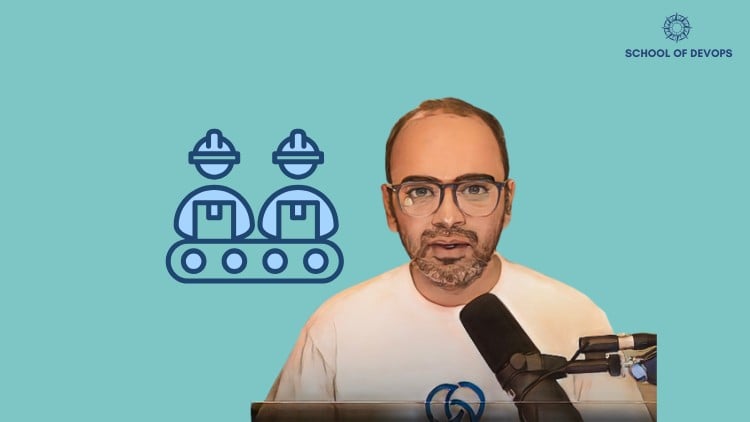
Modern CI Pipelines with Jenkins, Pipeline as Code, Blue Ocean, Git Branching Models, Docker Integration
⏱️ Length: 3.6 total hours
⭐ 4.29/5 rating
👥 11,956 students
🔄 March 2025 update
Add-On Information:
Note➛ Make sure your 𝐔𝐝𝐞𝐦𝐲 cart has only this course you're going to enroll it now, Remove all other courses from the 𝐔𝐝𝐞𝐦𝐲 cart before Enrolling!
- Course Overview
- This top-rated course (4.29/5, 11,956 students, March 2025 update) provides a hands-on guide to building robust CI/CD pipelines using Jenkins and Docker.
- Master “Pipeline as Code” with Jenkinsfile, transforming your CI/CD setup into version-controlled, reproducible assets for consistent automation.
- Explore essential Git branching models and implement pull-request based workflows, crucial for modern team collaboration and code quality.
- Leverage Docker for consistent, isolated build environments, eliminating “works on my machine” issues and accelerating your build processes significantly.
- Designed for developers, DevOps engineers, and QA, this course delivers practical skills to automate software delivery from code commit to deployment readiness.
- Requirements / Prerequisites
- Basic Command-Line Proficiency: Familiarity with terminal commands in Linux/Unix environments for executing scripts and navigation is recommended.
- Fundamental Docker Knowledge: A basic understanding of Docker images, containers, and Dockerfiles will be highly beneficial for the course’s integration topics.
- Git Version Control Basics: Experience with core Git commands like commit, push, pull, and branching concepts is necessary for source code management integration.
- General Software Development Context: An awareness of the software development lifecycle provides a helpful framework for understanding pipeline automation.
- Development Setup: A computer capable of running Docker Desktop (or Linux with Docker Engine) and a stable internet connection for practical exercises.
- Skills Covered / Tools Used
- Jenkins Deployment & Management: Configure and operate Jenkins servers and agents, utilizing its powerful ecosystem for continuous integration.
- Docker Integration: Embed Docker for containerized Jenkins, consistent build environments, and automating application image creation within pipelines.
- Git Workflow Automation: Implement Git branching models and pull-request strategies directly within your CI/CD pipelines for seamless development.
- Pipeline as Code Mastery: Define entire CI/CD workflows using declarative Jenkinsfiles, enabling version control, auditability, and team collaboration on pipeline logic.
- Automated Build & Test Orchestration: Design and execute automated sequences for compiling code, running tests, and performing quality checks upon every code change.
- Multi-Branch Pipeline Configuration: Set up dynamic pipelines that automatically discover and process new branches and pull requests in your Git repositories.
- Container Image Lifecycle Automation: Automate building, tagging, and pushing Docker images from your source code using Jenkins, ready for deployment.
- CI/CD Pipeline Visualization: Utilize Blue Ocean UI for intuitive, real-time monitoring and troubleshooting of pipeline execution, enhancing transparency.
- Best Practices for CI/CD: Apply industry-standard methods for building scalable, secure, and maintainable automated software delivery pipelines.
- Benefits / Outcomes
- Accelerated Delivery Cycles: Drastically reduce time-to-market by automating repetitive tasks, enabling faster and more frequent software releases.
- Enhanced Software Quality: Improve code reliability and stability through early defect detection, automated testing, and consistent build environments.
- Increased Team Efficiency: Empower developers to focus on innovation by minimizing manual interventions and streamlining the development workflow.
- In-Demand DevOps Expertise: Acquire practical, sought-after skills in Jenkins and Docker, highly valued in modern DevOps and software engineering roles.
- Scalable Pipeline Design: Learn to architect robust and extensible CI/CD solutions that can adapt and grow with your project’s evolving needs.
- PROS
- Highly Practical Approach: Offers extensive hands-on exercises, ensuring learners gain direct experience in configuring and deploying CI/CD pipelines.
- Industry-Standard Tools: Focuses on Jenkins and Docker, providing skills that are immediately applicable and widely used across the tech industry.
- Modern “Pipeline as Code”: Emphasizes Jenkinsfile for pipeline definitions, teaching a crucial best practice for version-controlled and auditable CI/CD.
- Comprehensive CI Coverage: Integrates Git branching, Docker builds, and multi-branch pipelines, providing a holistic view of modern continuous integration.
- Up-to-Date Content: The March 2025 update guarantees relevance with the latest features and contemporary practices in CI/CD.
- CONS
- Pacing for Novices: Given its broad coverage in 3.6 hours, complete beginners to CI/CD or Docker might find the pace fast, potentially requiring supplementary learning.
Learning Tracks: English,IT & Software,Other IT & Software
Found It Free? Share It Fast!